It’s the age of artificial intelligence. Still, many of the webmasters are doing SEO like it’s 2010. They are unaware of the recent advancements in the SEO world. One of such major advancement is the usage of LSI keywords in your articles to gain topical relevance and rank higher in Google.
So, the main question is what are LSI keywords (Latent Semantic Indexing). Did I scare you away?
Keep reading.
How many of you are still targeting specific keywords and using it over and over again in your article hoping to get rankings for the keyword? I wouldn’t say that the effectiveness of keyword stuffing is completely gone, but it’s not worth the risk.
That’s where LSI keywords come into play.
Here’s the definition.
“LSI keywords are keywords that are related to the main keyword you are willing to rank for”. Most of times these are the synonyms for the main keyword. For example, “best fishing gear” has LSI keywords like “best fishing equipment”, “best fishing accessories”, and so on.
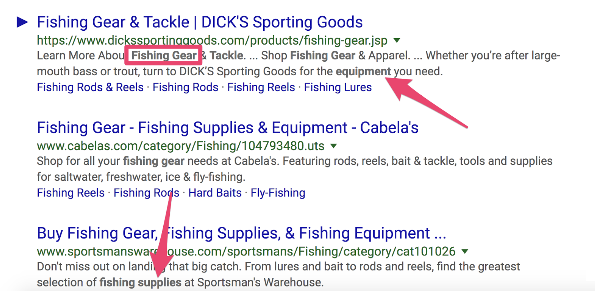
Including these kind of LSI keywords along with the main keyword in your article, enables your content to rank for the whole topic rather than a specific keyword. This sort of semantic SEO has gained popularity after the Google Hummingbird update which emphasized on relevancy.
How to find the LSI keywords that you can target in your blog post?
Now, perhaps you are convinced that you are missing a large pie of traffic by not including LSI keywords in your article and hence not doing topical optimization.
Well. What’s the fix?
You need to find good LSI keywords to include in your article. Here are some the ways by which you can find good LSI keywords to target in your article.
This is one of the most powerful strategies you need to include in your content apart from basic SEO techniques.
Google related searches
Believe it or not, it’s a goldmine of keyword ideas to target in your blog post.
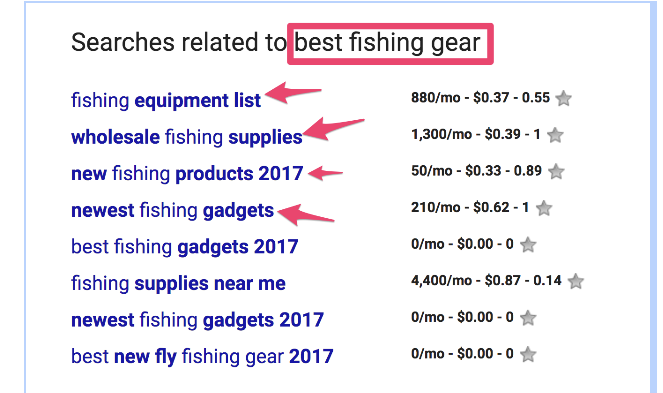
Want any more? In order to make the task easier for you, the big G has also highlighted the LSI or synonymous keywords, making it easy for you to steal!
This is not it.
Let me click on the first search suggestion – “fishing equipment list”
It gives rise to even more LSI keyword suggestions by Google.
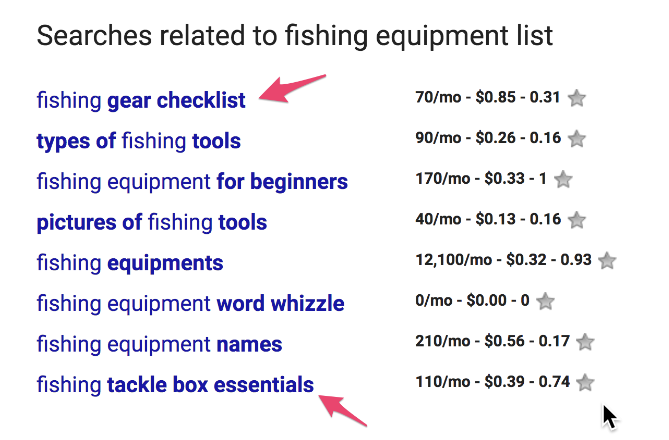
Rince and repeat.
PS: For getting search volumes and CPC right after the keywords I’m using – Keywords Everywhere Chrome extension (it’s free)
Use Ahrefs or SEMrush
You can also make use of tools like Ahrefs or SEMrush.
Let me take the example of Ahrefs in this case. In Ahrefs, you can enter any of your competitor’s blog URL. Let me enter the URL of a blog post that’s ranking for the keyword – “best fishing gear”.
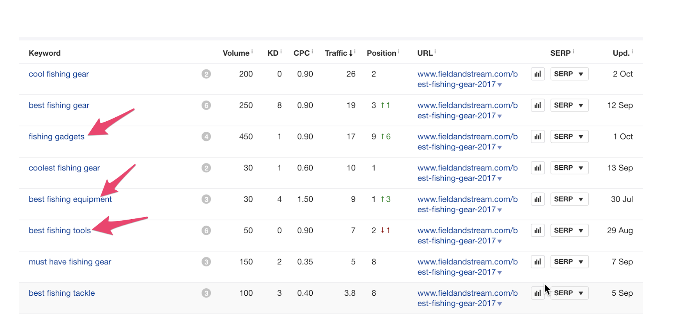
These are the all the keywords that the blog post is ranking for apart from the primary keyword they may be targeting. They are ranking for whole topic of fishing related things. This is made possible due to their clever usage of LSI keywords apart from their target keyword.
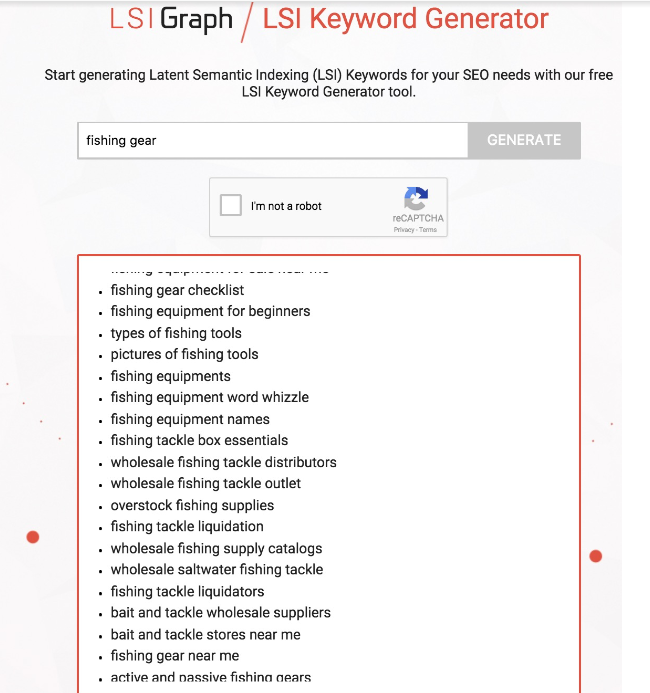
With the LSIGraph, you just need to enter the keyword for which you need to find LSI keywords for. The tool immediately pulls up some of the greatest LSI keywords for the main keyword.
Then you can manually copy these keywords to a good free bulk keyword volume checkers like KeywordKeg, and you’ll be good to go.
Using this tool is simply straightforward.
Wildcard suggestions
This is one of the most under-utilized keyword research strategies that can uncover good amount of LSI keywords to target in your blog posts.
Go to Suggestomatic. It’s a great tool that gives you great free keyword suggestions.
Along with Google Suggest it also allows you to find keywords for YouTube, Bing, Amazon, and others.
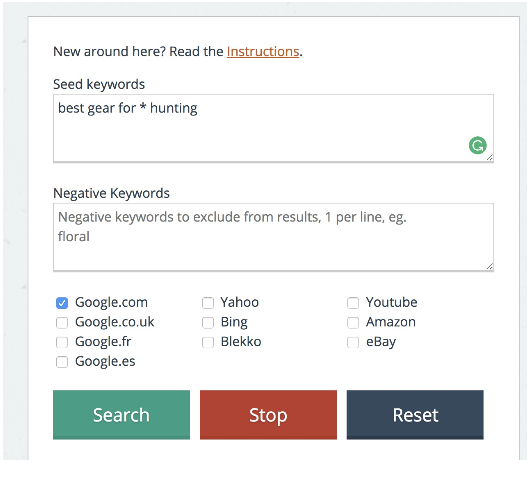
It’ll keep on searching for the keywords until you hit the stop button.
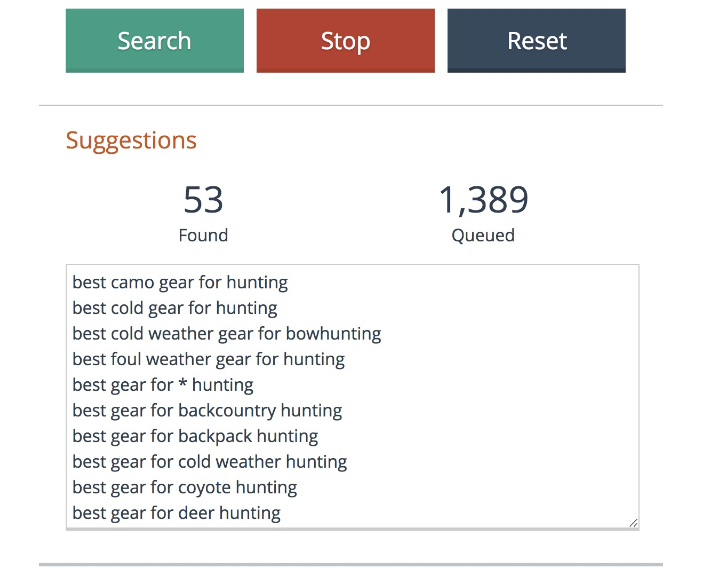
It’ll fill in the blank for the keyword. I entered – “best gear for * hunting”. This kind of keyword is called wildcard keyword research. This kind of keyword research technique lets you uncover even more topics and LSI keywords to target in your blog post.
Google Search Console
Your Google Search Console is a treasure-trove of LSI keywords. You may have noticed that, when you head over to search analytics in the Search Console, you’ll be presented with some of the keywords that are ranking for but may/may not be getting clicks.
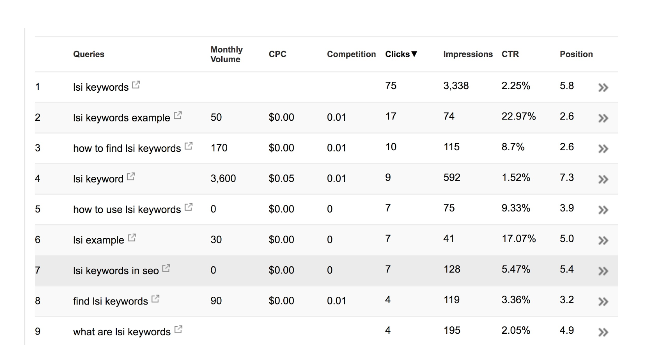
As you can see there are some of the keywords for which a site is ranking for, but not getting enough clicks. In that case, you can go ahead to the respective blog post and add some relevant content and LSI keywords. By this, you get traffic from the keywords you already are ranking for. This is such a powerful strategy.
Because, the Google Search Console and Analytics are free tools, people tend not to value them.
Wrap up
These are some of the greatest ways by which you can find the LSI keywords which you can target in your blog posts. Targeting LSI keywords is a great strategy to rank for the whole topic rather than a specific keyword you are targeting.
Make sure you use these LSI keywords naturally throughout your content especially in key areas like headings, meta description, and image alt tags.
Hope you found this post on LSI keywords helpful.

